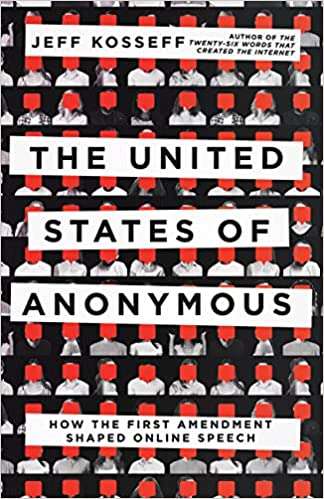The Volokh Conspiracy
Mostly law professors | Sometimes contrarian | Often libertarian | Always independent
Jeff Kosseff Guest-Blogging About "The United States of Anonymous"

I'm delighted to report that Prof. Jeff Kosseff (U.S. Naval Academy) will be guest-blogging this week about his new book, The United States of Anonymous: How the First Amendment Shaped Online Speech. From the publisher's summary and jacket blurbs:
In The United States of Anonymous, Jeff Kosseff explores how the right to anonymity has shaped American values, politics, business, security, and discourse, particularly as technology has enabled people to separate their identities from their communications.
Legal and political debates surrounding online privacy often focus on the Fourth Amendment's protection against unreasonable searches and seizures, overlooking the history and future of an equally powerful privacy right: the First Amendment's protection of anonymity. The United States of Anonymous features extensive and engaging interviews with people involved in the highest profile anonymity cases, as well as with those who have benefited from, and been harmed by, anonymous communications. Through these interviews, Kosseff explores how courts have protected anonymity for decades and, likewise, how law and technology have allowed individuals to control how much, if any, identifying information is associated with their communications. From blocking laws that prevent Ku Klux Klan members from wearing masks to restraining Alabama officials from forcing the NAACP to disclose its membership lists, and to refusing companies' requests to unmask online critics, courts have recognized that anonymity is a vital part of our free speech protections.
The United States of Anonymous weighs the tradeoffs between the right to hide identity and the harms of anonymity, concluding that we must maintain a strong, if not absolute, right to anonymous speech.
"From the world's leading expert on Section 230, a new book with a balanced and insightful look at online anonymity—the good and the bad—that is required reading for anyone who wants to substantively engage in this debate."
— Jimmy Wales, founder of Wikipedia"An indispensable, in-depth look at both the history and present of anonymity protections in American life, media, and online culture. The United States of Anonymous will have resounding implications for the future of democracy."
— Craig Newmark, founder of craigslist"Providing both a great story and keen legal analysis, Jeff Kosseff examines what fuels our commitment to protecting anonymous speech in the United States—and the new and sometimes high costs of that unwavering allegiance."
— Victoria Smith Ekstrand, author of Hot News in the Age of Big Data"Jeff Kosseff weaves together history, legal issues, and public affairs in this vital, timely, and highly readable book. The United States of Anonymous should be required reading for all engaged in the debate over anonymity, identity, and privacy in the online age."
— Jeff Jarvis, author of What Would Google Do?"Jeff Kosseff has, once again, spotted the next looming topic in technology law, anonymous communication, illuminating its contours with his trademark skill. The United States of Anonymous is a foundational dive into one of the toughest areas of speech, privacy, and identity today."
— Kate Klonick, St. John's University School of Law"A superb book, accessibly written, that canvasses the history of anonymous speech and its interaction with the law. Jeff Kosseff has created a major framework for any future discussions of anonymity."
— Anupam Chander, author of The Electronic Silk Road
I much look forward to Prof. Kosseff's posts.
Editor's Note: We invite comments and request that they be civil and on-topic. We do not moderate or assume any responsibility for comments, which are owned by the readers who post them. Comments do not represent the views of Reason.com or Reason Foundation. We reserve the right to delete any comment for any reason at any time. Comments may only be edited within 5 minutes of posting. Report abuses.
Please to post comments


For maximum leverage, the point of attack in California could be gun stores and ammunition sellers—folks who can get hit with a lot of judgments if they do not shut down.
I am of course not in favor of this tactic, anywhere for anything. Just mentioning where the leverage is to get it rescinded.
Wrong thread, apologies.
Steve. We both support repeated editing and deletion of comments by the commenter. That is the standard practice of almost all social media today.
There is no liability for the lynch mob. There should be. Employers, spouses, churches, clubs, licensing board, police, that damage a plaintiff as a result of speech are committing an intentional tort. They should be deterred with exemplary damages, instead, the vile. toxic, lawyer profession immunizes them.
Without liability for retaliation for speech, free speech rights are a joke. From the Soviet constitution of 1936. Sure we have freedom of speech, but get denounced end up in a Siberian gulag. Not much difference between that and the chilling woke threat, speech has consequences.
ARTICLE 125. In conformity with the interests of the working people, and in order to strengthen the socialist system, the citizens of the U.S.S.R. are guaranteed by law:
freedom of speech;
freedom of the press;
freedom of assembly, including the holding of mass meetings;
freedom of street processions and demonstrations.
These expressive rights under the Stalin Constitution were "collective rights"-- the agent of the people (aka the Soviet government) would exercise these rights in the people's name. Similarly in the USA, some tell us that the Second Amendment is a collective right, empowering the people's agent (the government) to maintain government armories.
So if the government goes into the weeds, the first thing they'll do is throw open the armories so The People can resist them?
Sounds good!
I generally support anonymous speech, provided it stays anonymous.
But I take a harsh view of "false-flag" speech, eg putting inflammatory racism in the mouth of a political opponent. The victim of false-flag speech should be given legal and civil-society tools to unmask his slanderer.